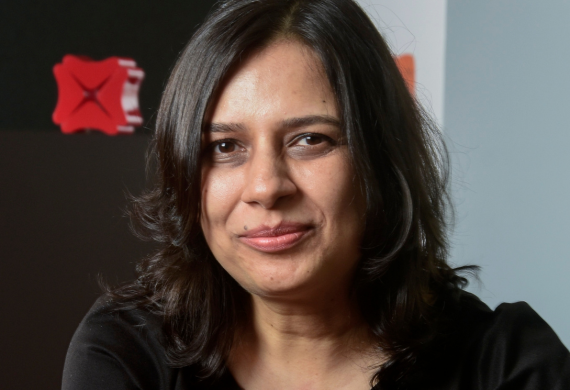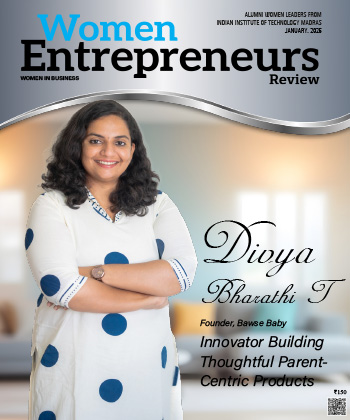
Financial Institutions Must Support Women in Financial Planning, Believes DBS Bank India
By: Shoma Narayanan, Managing Director & Head -Group Strategic Marketing & Communications, DBS Bank India
Shoma Narayanan, a seasoned marketing professional with nearly two decades of experience in both digital and traditional marketing, product management, and sales in the banking sector. Formerly with HSBC, she specializes in marketing strategy and corporate branding.
In a recent conversation with Women Entrepreneurs Review Magazine, Shoma discussed DBS Bank India's collaboration with CRISIL for the Women and Finance report, exploring urban Indian women's financial journeys and strategies for engaging diverse female demographics across banking channels.
DBS Bank India recently collaborated with CRISIL to release the Women and Finance report, which aims to understand the financial journey of urban women in India. What were the key trends that emerged from the report?
The first report in the 'Women and Finance' series, released in January this year, explored the financial preferences of salaried and self-employed women across various life stages. It offered insights into their involvement in financial decision-making, goal setting, saving, and investing patterns, adoption of digital tools, and preferences for different banking products.
One key trend from the report is the growing financial autonomy among Indian women. An encouraging 98% actively participate in long-term family decision-making, while about 47% make independent financial decisions. Age and affluence significantly shape these decisions. For example, 65% of women over 45 years old make independent financial choices, given their experience, compared to 41% of those aged 25-35 years.
The findings also revealed that female earners in metropolitan areas tend to be risk averse. About 51% of their investments are parked in fixed deposits (FDs) and savings accounts, followed by 16% in gold, 15% in mutual funds, 10% in real estate, and just 7% in stocks. Interestingly, a similar trend is observed among our own customers, with approximately 10% of our female customers having an active fixed deposit, compared to just 5% of male customers.
Building on the first part, we released the second report in March, which delved into the unique circumstances of women in the workforce, including their professional aspirations, habits, and the barriers they face. The findings confirmed industry views on persistent gender disparities in the workplace, revealing that the perceived gender pay gap at a pan-India level stands at 23% among salaried women, while perceived gender bias is at 16%.
The report also highlighted the policies and initiatives preferred by salaried women. For instance, in Kolkata, 46% consider mentorship and career advancement opportunities important. In Delhi, 33% value childcare support facilities offered by organisations, while 32% accord the most importance to extended maternity benefits in Chennai. This aligns with behaviours within our own organisation, as a recent internal survey showed female employees ranked mentorship and career advancement opportunities (19%) and support for expecting mothers (16%) as the top initiatives they found most valuable.
While the report focuses on urban Indian women, considering your pan-India presence, do you see similar trends among Indian women from small towns?
While our report primarily focuses on urban salaried and self-employed women in India, we anticipate similar trends among women from smaller towns. For example, the preference for asset classes such as savings accounts, fixed deposits, and gold might be common among women in both urban and smaller town environments, reflecting a shared approach to financial security. However, beyond these similarities, other preferences and challenges are likely to vary, influenced by local cultural and economic factors.We are also planning a survey to understand trends among self-employed women in smaller towns, which will be conducted by Haqdarshak, a social enterprise supported by the DBS Foundation.
How can we tailor marketing strategies to effectively engage women of different age groups across various banking and payment channels, considering the evolving landscape? Are there any upcoming campaigns from DBS Bank India focusing on women?
The Women and Finance study is a great example of how DBS embodies being a different kind of bank, rather than fitting into the conventional notions of a 'traditional bank'. Given that the report offers comprehensive insights into the financial preferences and behaviours of female earners, we aim to refine our approach when communicating with this segment.
For instance, our study indicates that older women tend to make more autonomous financial decisions and are less inclined towards digital payment methods than their younger counterparts. This emphasises the importance of campaigns not only promoting digital financial solutions but also educating women on their advantages and security. The report also highlights variations in digital adoption across different cities, with Delhi exhibiting higher rates compared to Kolkata. Drawing from these insights, we will tailor our creative content and messaging, ensuring a targeted approach that resonates more effectively with women in each city.
With more women actively participating in long-term family decision-making, how can financial institutions encourage and support women in taking more leadership roles in managing household finances?
As women become more involved in long-term family decision-making, financial institutions have an opportunity to support them better in financial planning. However, it extends beyond managing household finances; there is a need to enhance education and awareness initiatives. For instance, our study shows that women often prefer safer investments like fixed deposits and savings accounts. This underscores the opportunity to educate them about the benefits of diversifying their investment portfolios. Additionally, retirement planning is a priority, especially for women aged 35-40, particularly those who are married. Financial institutions, like ours, can help younger women start their financial planning journey early and encourage them to set comprehensive financial goals.
How does DBS Bank India actively contribute to the personal and professional advancement of women?
Within DBS Bank India, we actively foster the professional growth of women through regular career development sessions, mentorship opportunities, job shadowing experiences, and dedicated learning and development programs. Additionally, we have established social learning communities within the bank to further support women. Recently, we introduced a six-month internship program tailored for women returning to the workforce. Selected participants engage in projects, benefit from guidance provided by experienced industry leaders, and participate in training programs to enhance their skills.
Furthermore, the DBS Foundation supports social protection and financial literacy programs aimed at women and marginalised citizens. These programs, facilitated by Haqdarshak, empower participants to enhance their digital and financial capabilities and enable access to relevant government entitlements and private financial services.
Most Viewed
- 1 Women's Health Startup HerMD Closing Doors Amid Industry Challenges
- 2 5 Famous Women in Indian Armed Forces
- 3 Saudi Women No longer Require Male Permission for Clothing Choices, says Prince MbS
- 4 Kolkata Medtech Startup Innovodigm Raises Rs 5.5 Crore Seed Funding Led by IAN Group
- 5 Yamunanagar's Kashish Kalra Honoured after Securing 111th Rank in UPSC Civil Services Exam
- 6 Madurai Appoints Its First Woman Corporation Head
- 7 IAS Vijayalakshmi Bidari Appointed as the new Nagpur Divisional Commissioner
- 8 American Entrepreneur Lucy Guo Overtakes T Swift to become Youngest Female Billionaire
- 9 ICC Women's World Cup 2025 Trophy Showcased at Indore's Holkar Stadium
- 10 Aparna Saxena's Beauty Venture AntiNorm Launches in India
- 11 Vidya Nataraj Co-Founded BlueStone Jewellery & Lifestyle files IPO
- 12 5 Women Freedom Fighters of India
- 13 Dr. G Krishnapriya appointed as CEO for Trichy
- 14 M3M & Sirona Partner to Introduce Menstrual Hygiene Vending Machines in 15 Locations
- 15 Punjab Govt launches SHE Cohort 3.0 Supporting Tech-led Women Startups
- 16 Indian origin Lawyer, Sweena Pannu appointed as the US New Superior Court Judge
- 17 The Aurora Tech Award recognizes 4 Indian Women-led Startups
- 18 Kerala's Republic Day parade featured an all-female tableau
- 19 Manisha Kabbur Becomes Karnataka's First Woman International Karate Coach
- 20 Director K. S. Ravikumar's Daughter Maalica Ravikumar Launches Life Coaching Company 'Evergrowth Academy' for Women
- 21 Leezu's Raises Pre-Seed Funding to Accelerate Growth in Sexual Wellness Industry
- 22 Sattu: Super-easy summer drink for PCOS gut healing
- 23 Swathi Nelabhatla creates Sitha App, India's First Women-Exclusive Gig Platform
- 24 7 Timeless Female Kathak Dancers & their Iconic Legacies
- 25 Meet 7 Iconic Women Architects of Modern India & their Most Impactful Work
- 26 This Woman-led Insuretech Startup is Helping Bridge the Education Financing Gap in India
- 27 Women Leaders Share Lessons Learnt from India Women's WC Win
- 28 5 Enterprising Women Founders Powering Singapore's Tech & Innovation Landscape
- 29 4 Women. 4 Stories. One Vision for Smarter, Stronger Healthcare
- 30 Global Gender Gap Narrows to 68.8%, But Full Equality 123 Years Away: WEF Report 2025
- 31 Changemakers: 7 Women Entrepreneurs Taking the Make in India Movement Forward
- 32 Meet Lucy Guo, The Youngest Self-Made Female Billionaire Disrupting Tech
- 33 How Women are Driving India's Festive Online Shopping Surge






